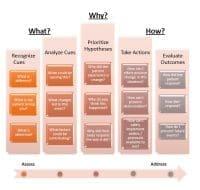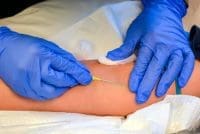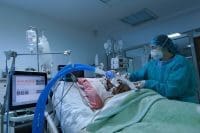Before the COVID-19 pandemic, the American Nurses Association and the U.S. Bureau of Labor Statistics forecast the retirement of more than half a million registered nurses by 2022. They make up just a small fraction of the more than 76 million Baby Boomers projected to retire at a rate of 10,000 a day as the incidence of chronic disease is on the uptick. To address the rapid aging of America we must grow the healthcare workforce, especially RNs, to meet the mounting health needs of all our citizens.
Unfortunately, recent reports from ECRI and in the Journal of Continuing Education in Nursing have highlighted concerns about the nursing practice environment, such as overwhelming work demands, inadequate staffing, and rising levels of burnout, further elevating concerns about a nurse workforce shortage. One solution to meet the rising demand for more nurses would be to educate more nurses. Yet, schools of nursing have been struggling with the lack of qualified nursing faculty, thus limiting the numbers of applicants who can be admitted.
One might wonder, given nurse workforce concerns before COVID-19, what will the workforce capacity be when we emerge from this ongoing healthcare crisis? Nurses on the frontline of the pandemic report feeling frustrated, lonely, and stressed by working in unfamiliar clinical settings, not going home for fear of infecting loved ones, and caring for co-workers who died. Many are haunted by the COVID-19 experience and yearning for the time they can enjoy their profession again. Will the COVID-19 nurse warriors remain in the nursing workforce post-pandemic during a time when the demand for nurses is increasing dramatically? And what will be the state of their emotional and physical wellbeing?
These questions are being addressed through a national study launched earlier this year by the Fitzpatrick College of Nursing at Villanova University. The Caring About Health for All Study (CHAMPS) is designed to examine the immediate emotional and physical impact of delivering care during COVID-19 and to serve as a health registry over time to understand the long-term effects on the health, lives and careers of frontline workers.
The CHAMPS Study will provide knowledge and data to enable governments, healthcare organizations, providers, and other stakeholders to understand the broad impact of COVID-19 on those delivering essential care. Ultimately, CHAMPS will inform public health strategies designed to mitigate these effects during future health emergencies and highlight the needs of those who were our champs during COVID-19—and it’s crucial that we hear from RNs, so we can better understand and meet their emergent health needs.
It’s ironic that this disaster captured the globe as the World Health Organization declared 2020 the International Year of the Nurse and Midwife. What an appropriate context for nursing to ascend as an even more esteemed profession.
This moment in history offers opportunities that the nursing profession must seize. For instance faculty roles in schools of nursing must be promoted through financial support for those pursuing education to serve as highly qualified faculty. Faculty salaries must be increased to be comparable to salaries that one could earn in practice in order to recruit and retain these essential academic nurses. Financial assistance through grants, scholarships, and loan forgiveness programs (which are already being discussed) would assist qualified applicants to enter schools of nursing (once we build faculty numbers) and augment the future nursing workforce.
There are also other opportunities that need to be captured. For example, in some regions, scope of practice regulations for nurse practitioners have been expanded to meet the increased demand for care during the pandemic. These temporary enhancements to the nursing scope of practice must become permanent to increase access to healthcare. In addition, nurses need to continue to clearly demonstrate their genius to solve important issues through their inherently innovative minds and collaborative nature as they have done during the pandemic, working with engineers to develop ventilator prototypes, implementing creative and caring means for families to remain connected, and so much more.
The eyes of the world are on us. Nurses have limitless opportunities to provide leadership. Let us cohesively and inclusively use this power to not only educate but to also impact policy and practice to build positive work environments and effective and equitable health care systems in our diverse society.
Donna Havens is the Connelly Endowed Dean and Professor of the M. Louise Fitzpatrick College of Nursing at Villanova University.



















8 Comments. Leave new
It is alarming to think about the growing number of nurses reaching retirement and the growing number of baby boomers that will require nursing care in the years to come with the increased numbers of chronic illnesses. Personally, I began my nursing career in long term care, the nurses are expected to take on 20 to 25 patients on their own. I was still working in long term care when the pandemic began and the lock-down occurred. I witnessed many deaths due to the patients giving up because they felt isolated and could not be with their families. The hospital policies changed to help with the covid-19 pandemic and they were able to push patients out faster. The nurses in rehab and long-term care facilities were still expected to take on the 20 to 25 patient workloads while the acuity of the patients continued to increase. It became very difficult and many nurses I talked to were burnt out, struggling with anxiety, and struggling with spiraling depression. We were expected to be the patient’s emotional support system since they were isolated, expected to take on higher acuities with the same patient to nurse ratio, and expected to gown and sanitize with each patient interaction. It felt that the impossible was expected of us, the demands would never stop. It is frightening to think that this pandemic could push many nurses out of the field entirely, push many to retire early, and further increase the nursing shortage. It is important to keep in mind that we became nurses to help people and to not lose sight of this through these difficult times. Increasing pay for nurse educators would allow for a greater number of nurses to enter the field, this is one of the many possibilities to improve the nursing shortage.
I have only been a registered nurse for a short time, but I can only imagine how this crisis will impact me for years to come. I have been working in an LTAC unit that is attached to a skilled nursing facility and inpatient rehab center. Recently we have had a COVID outbreak on our unit and although we have been working tirelessly to ensure that the spread does not get out of hand, more and more patients and employees have fallen ill in recent weeks. We have been told time and time again that we must reuse our PPE and that we currently have no access to new masks, nor do we have any hope of receiving new PPE in the future. I can honestly say that it has been a very terrifying experience to watch this turn of events and despite the dangerous working conditions, our amazing nursing staff, RNs, LPNs, and UAPs, continue to show up to work because we value the lives of our patients. It amazes me as these men and women put forth so much effort working in unfair ratios with minimal protection. I agree that we must put forth every effort to expand our workforce as those who are currently working are burning out. I personally know several nurses who have decided to give up their practice because they are simply too tired to continue. We must find a way to assist these nurses of tomorrow to reach their goal in order to provide assistance to the exhausted workforce. By doing this we must also, assist the teachers of today by assisting with clinical instruction, requesting increased salary to assist in the appeal of becoming a nurse educator, or offering loan forgiveness for those who choose to walk down the academic route as opposed to the clinical path. We must make every effort to preserve our future and changes need to be made to ensure that we have a future to look foward to.
I started as adn then got my bsn and msn and finally became a nurse practioner.
I always wanted to be a nurse-worked full
time for 50 years and was happy to do so.
I’ve been retired for 2 years and I would love to have a part time job. I miss being a
nurse but I doubt that anyone would hire me. They would think I was to old.
What a well written article! In 2021, I will have been an RN for fifty years. I graduated from a diploma school that was being converted to a BSN program. I received my BSN in 1982 and a MSA in 2001. I have worked in a number of different areas- neuro, psych, med-surg, gerontology, home health, and in a group home situation as a contract nurse. I have never regretted becoming a nurse. I feel that nursing should encompass and support all nurses-associate degree nurses and LPN’s. I have worked with some excellent LPN’s and diploma graduates over the years.
The online nursing faculty must not be forgotten, either. There are many nurse faculty in brick and mortar colleges who work “extra” teaching online for other colleges to pay for exotic vacations. In addition, they receive pay raises. Online faculty who work, principally, in for-profit universities never receive pay raises, because the colleges keep their employment to part-time (to prevent paying benefits). They will lose their faculty to the brick and mortar colleges if and when the faculty in the latter receive the pay raises that they deserve. It is a shame, because some nurses are disabled and can only work online and there are some who prefer to teach online. When is nursing administration going to tackle the labor problems of its staff?
I agree with the above comment. Other healthcare professionals are working on the frontlines to provide needed care just not in the acute care setting. Our Home Health care workers and those working in Long Term Care facilities as just as important. Given the opportunity and support needed, many of these young workers may become the RNs of tomorrow.
I understand we need RN’s. I have been a very qualified LPN/LVN for 33 years and I have worked Ali g side many RN’s often teaching them bedside nursing because they spent so much time reading books on leadership. The LPN does not receive enough support or respect and too be very honest we work hard and are the true frontline workers while the RN is sitting at the desk. The future goal of nursing should reflect nursing as a whole for both LPN and RN. Bring back opportunities for LPN’s that have worked hard and allow them to grandfather in like it once was.
There are other healthcare professionals in the frontlines during this pandemic. Namely LPN/LVN, Nursing Assistants, Home care Worker’s and others. Some of the members
Of these groups may makeup the group of
Tomorrow’s RNs once the pay for RN educators are equitable with other advanced degrees RNs